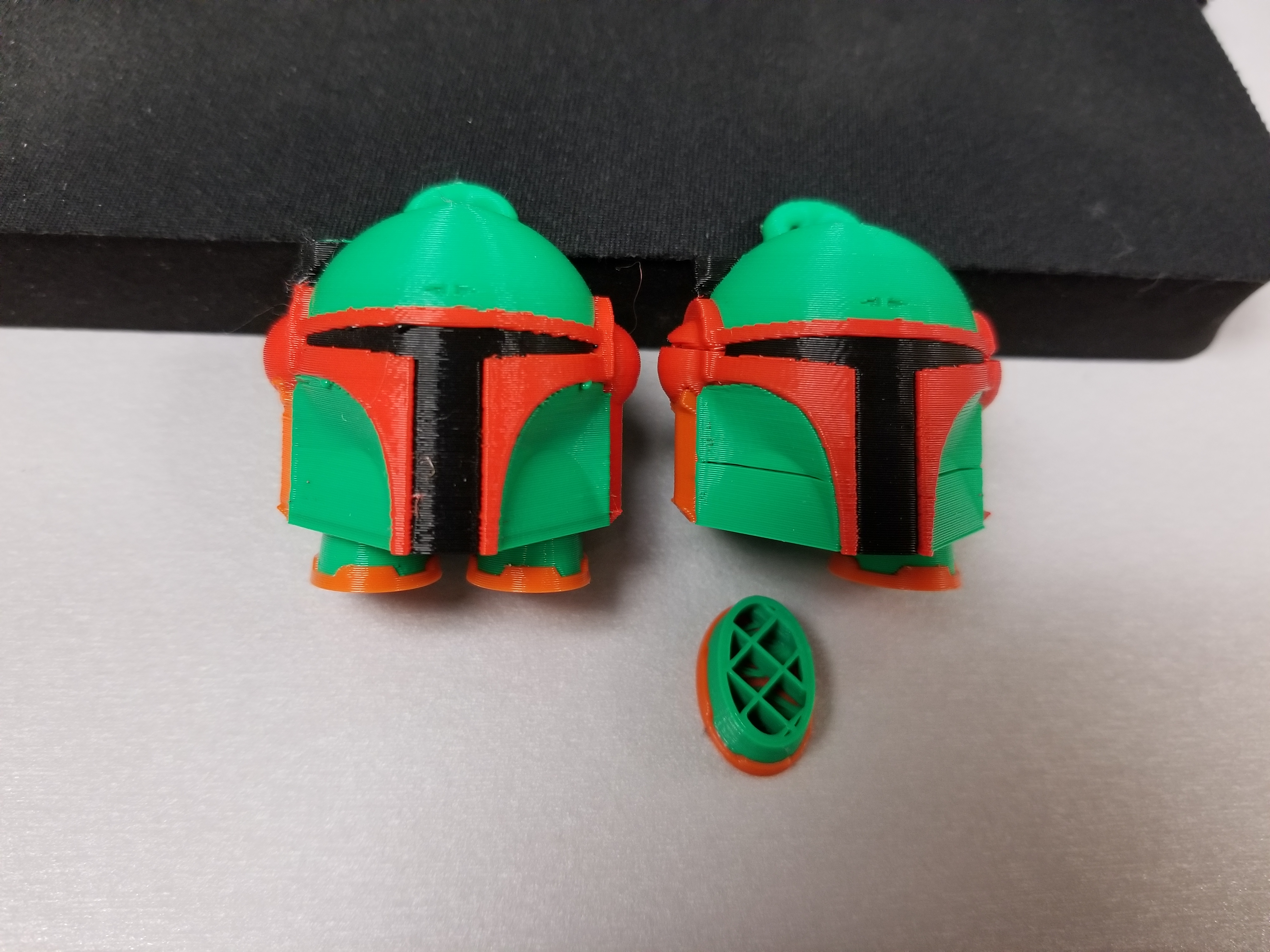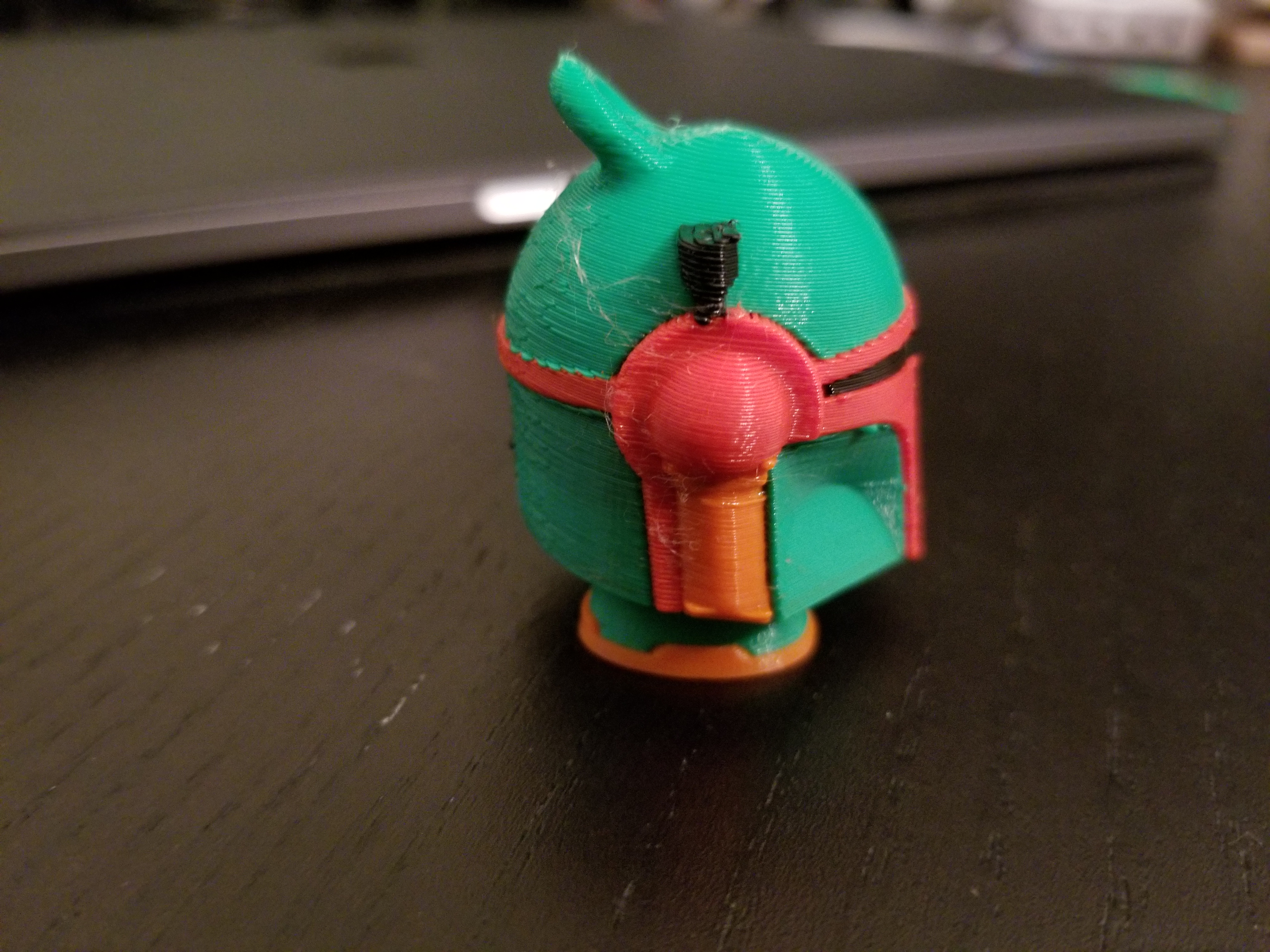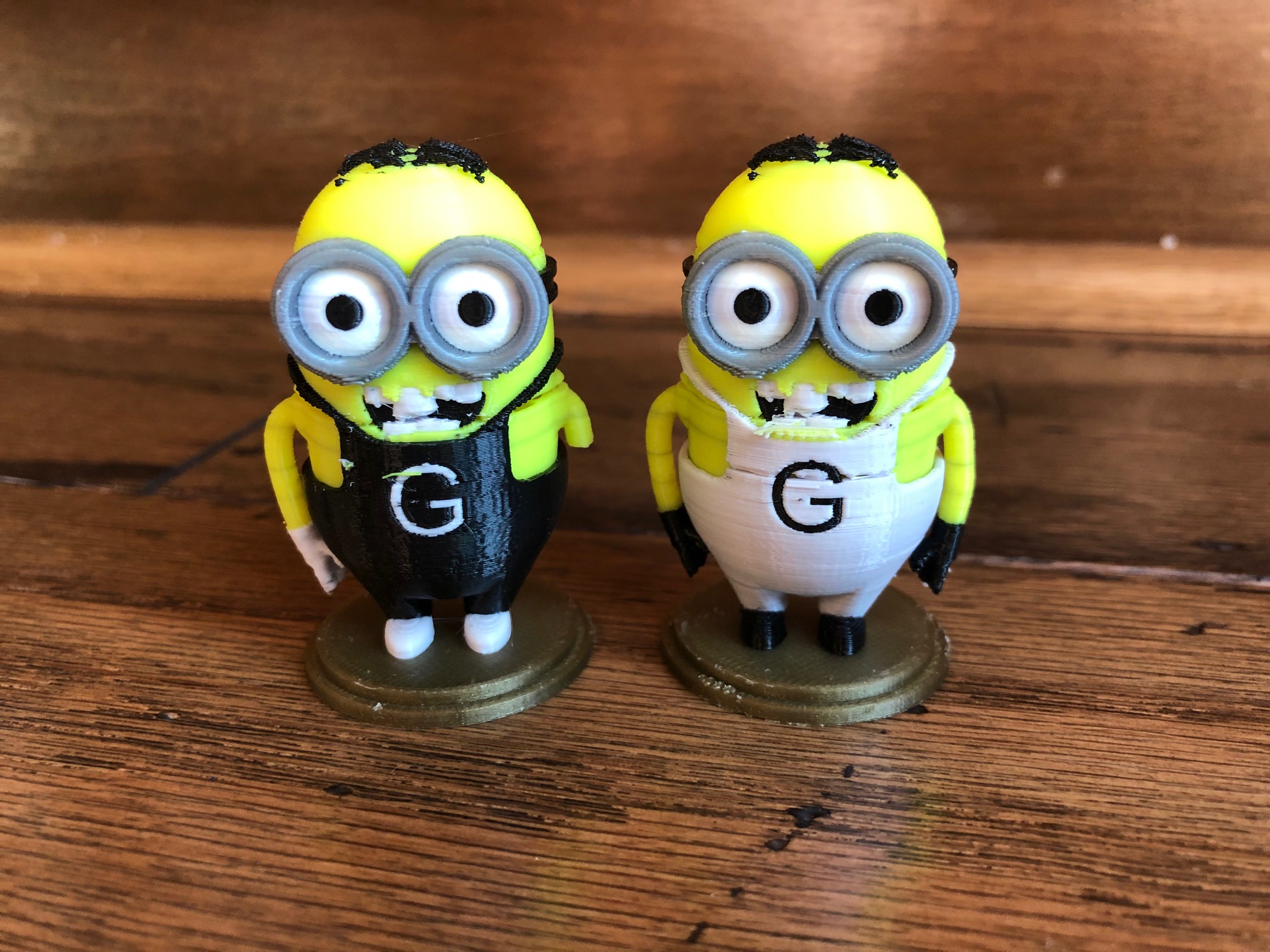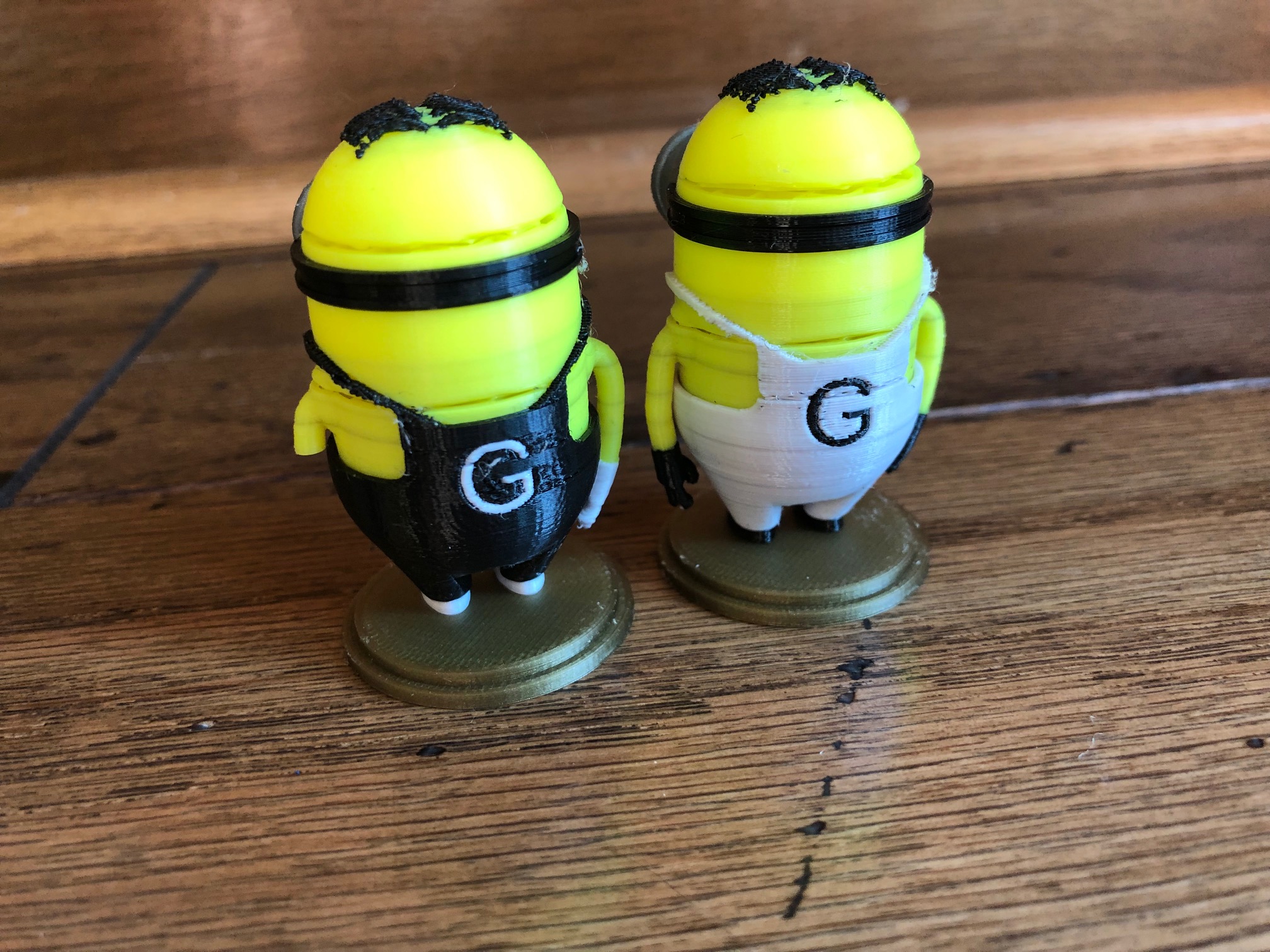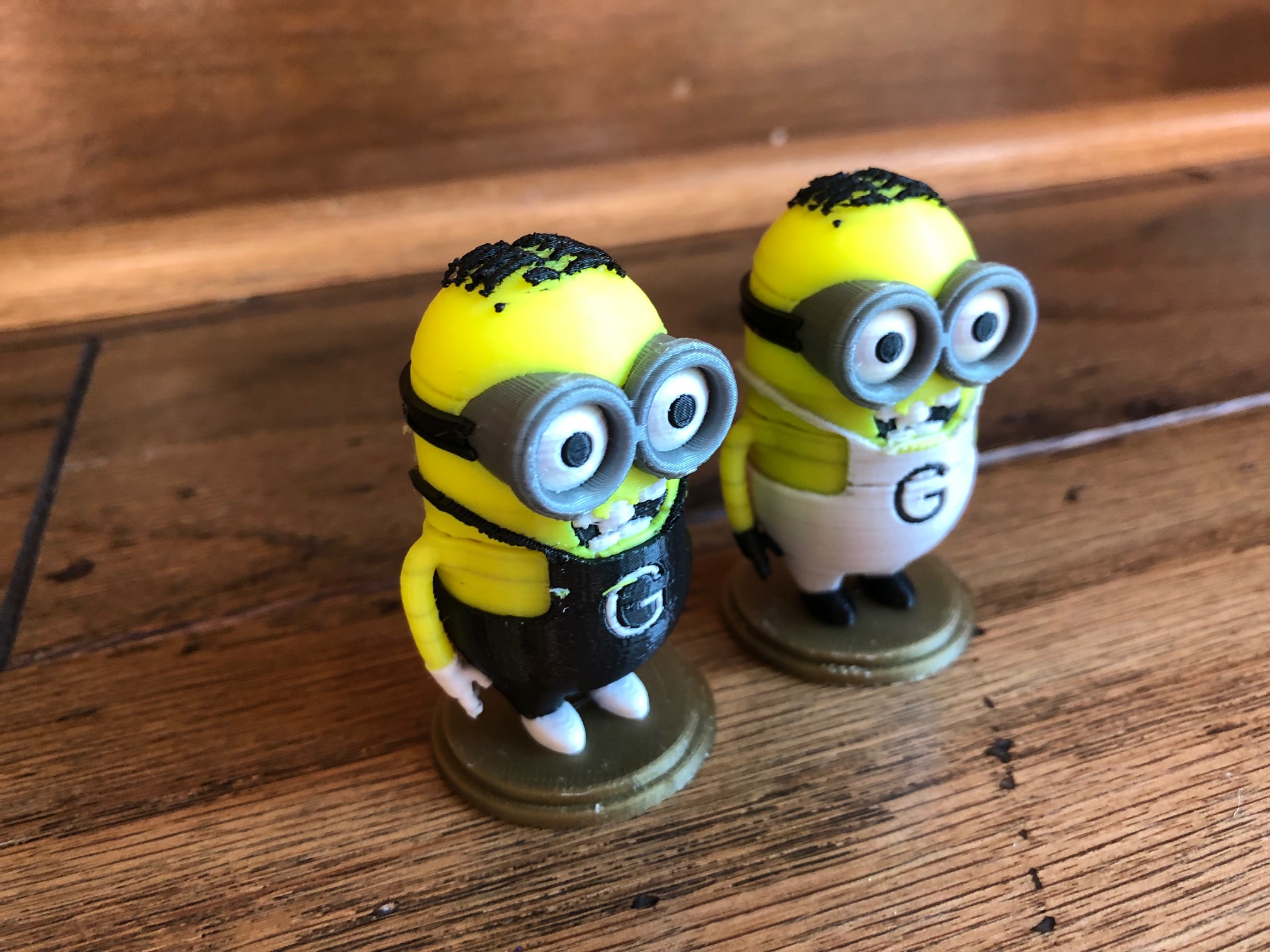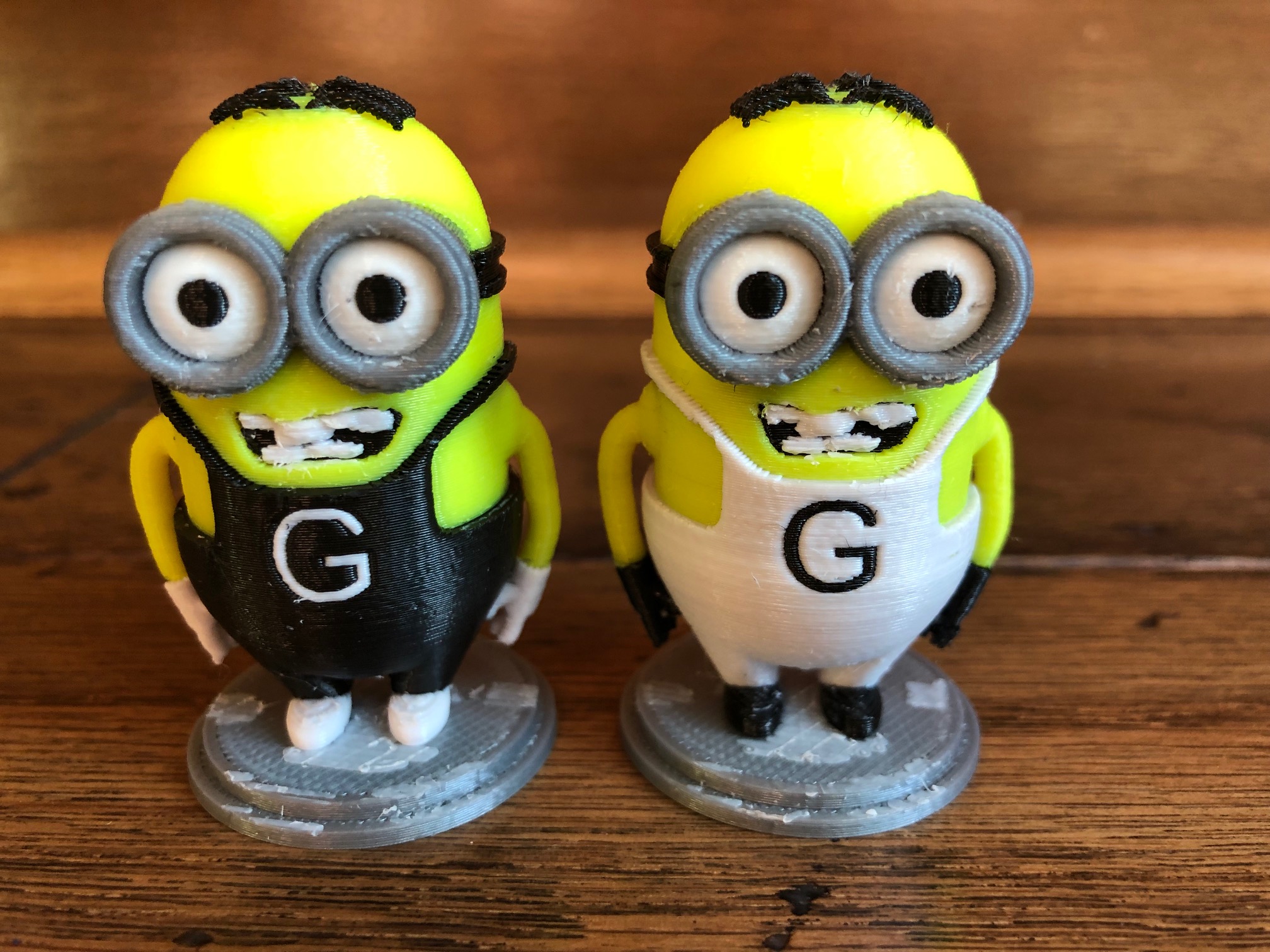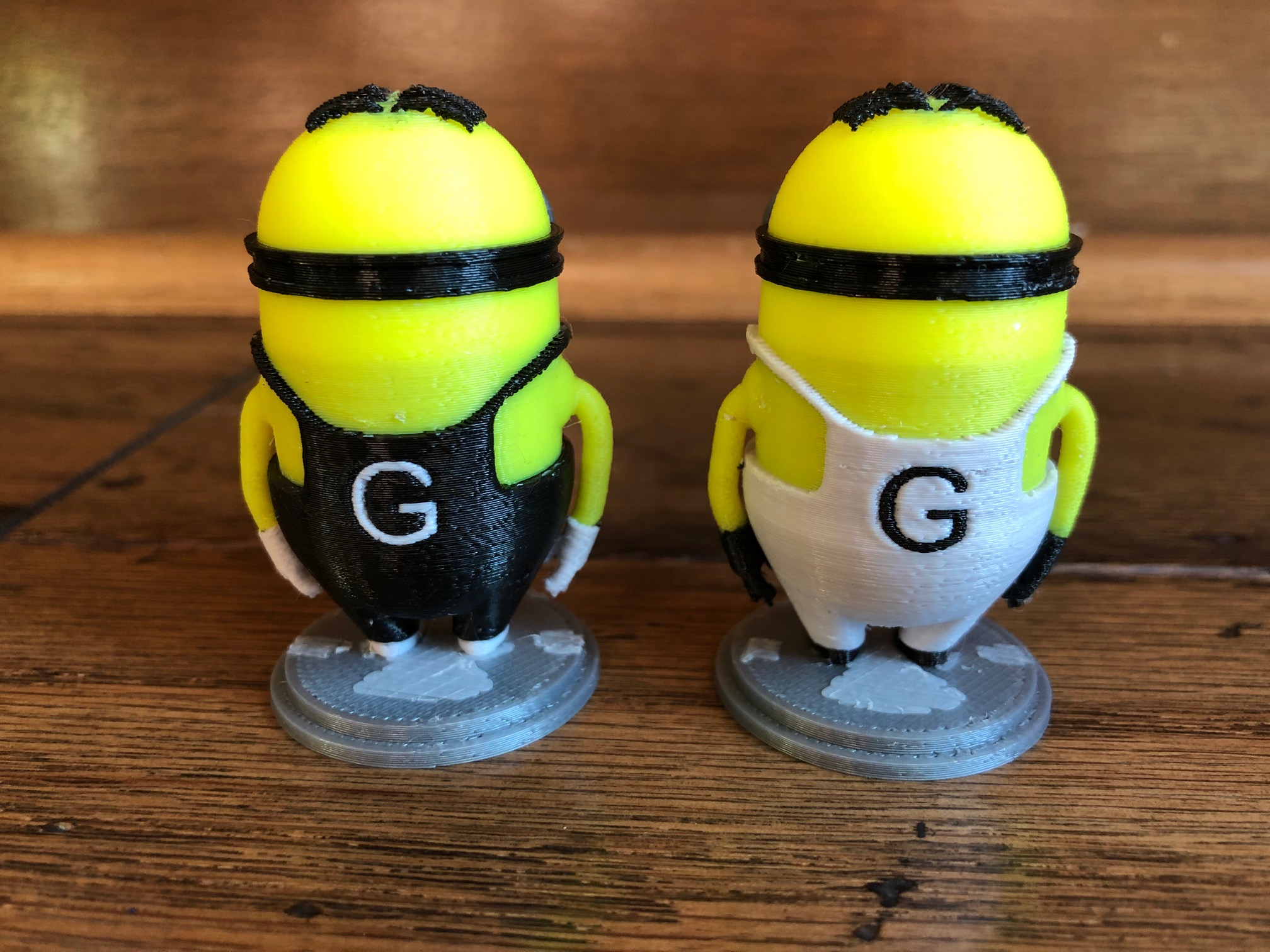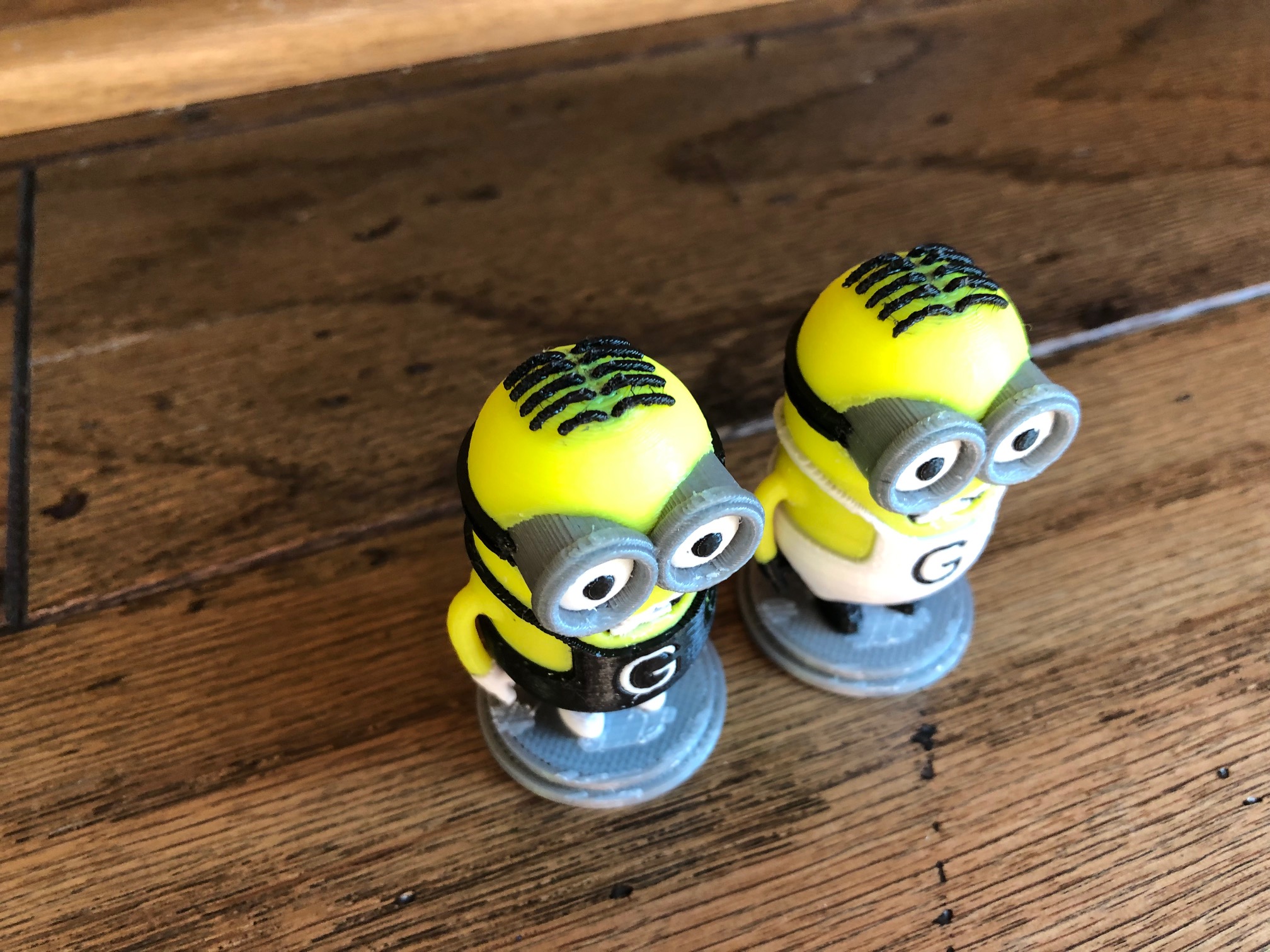Re: Comparing MMU2 and Palette+
On Palette2 you're screwed if something goes wrong.
I was screwed on every MMU print I attempted due to missed layers.
The Palette fuses TPU and PLA very well from the sample objects I saw. The creator of the Palette walks around with a PLA / TPU Apple watch band.
Re: Comparing MMU2 and Palette+
To make it short. This document describes which material combinations can work with Palette.
If that covers the requirements, and missing layer on MMU2 (definitely a weak point at the current state) is driving you nuts then I would also recommend Palette.
But if you want a transparent (PETG) window in a house (PLA) or put a Nylon/PC core in a functional ABS part, Palette is a wrong product for this. But with MMU2 it can work.
Often linked posts:
Going small with MMU2
Real Multi Material
My prints on Instagram
Re: Comparing MMU2 and Palette+
Got the Palette 2 setup today and ran my first single material multi color print and..... it worked flawlessly. That single successful print was more than what I achieved in nearly 3 months of ownership with the MMU 2.0. I'll start putting the Palette through its paces tomorrow but I have no doubt that it will be able to handle a large print with no issues.
Another thing that won me over was the spool holders. I had to blow up my entire workspace to accommodate the spool holders for the MMU 2.0. So much cleaner with the Palette
Re: Comparing MMU2 and Palette+
Seriously considering joining you.
I am still struggling with MMU 2 and after modding the spools and the tube into the extruder, I am still unable to get consistent feeds and loads. To be honest I am fed up with it.
Re: Comparing MMU2 and Palette+
Seriously considering joining you.
I am still struggling with MMU 2 and after modding the spools and the tube into the extruder, I am still unable to get consistent feeds and loads. To be honest I am fed up with it.
Dont give up it can work well. I was super frustrated, look in some of the earliest post here. If u give up its money wasted.
(Palette2 much more easier, splice and forget status achieved, and now I've dona pva also)
Prusa MK3 > MK4s
Prusa MK2.5 kit > MK3 > MK3s > MK4s
Prusa SL1 3D printer + Curing and Washing Machine (day1 order)
Taz6 - taken apart for space
CR10s4 - upgrading
Delta 3ku - dont use
Re: Comparing MMU2 and Palette+
If u give up its money wasted.
(Palette2 much more easier, splice and forget status achieved, and now I've dona pva also)
Only money wasted in filament. Prusa had no problems taking mine back after using it for nearly 3 months.
Re: Comparing MMU2 and Palette+
2nd out of the box print was perfection. 294 splices roughly 8 hours. Here's a picture comparing the print next to the closest thing that I'd call successful from the MMU 2.0.
You'll notice on the MMU print the leg is broken off due to a missed layer and there are several red missing layers and a green.
MMU print close up:
Palette 2 print close up:
Re: Comparing MMU2 and Palette+
Does Palette print looks worse at the back or is it just a bad angle?
Often linked posts:
Going small with MMU2
Real Multi Material
My prints on Instagram
Re: Comparing MMU2 and Palette+
Does Palette print looks worse at the back or is it just a bad angle?
There are zits on the back of the print. I spent zero time messing with the slicer. I just wanted to see it print this model with almost 300 splices successfully.
Re: Comparing MMU2 and Palette+
There are zits on the back of the print. I spent zero time messing with the slicer. I just wanted to see it print this model with almost 300 splices successfully.
Sure, You're describing the out-of-the-box experience. MMU2 print looks nicer to me despite of the missing layer, that's why I asked.
Often linked posts:
Going small with MMU2
Real Multi Material
My prints on Instagram
Re: Comparing MMU2 and Palette+
I would like to see a 2000+ color change before even thinking about it
I have a Prusa,therefore I research.
Re: Comparing MMU2 and Palette+
Sure, You're describing the out-of-the-box experience. MMU2 print looks nicer to me despite of the missing layer, that's why I asked.
The colors are much more dull on the MMU print. I know that could be fixed by adjusting purge volumes. Keep in mind that this is an out of the box success from the Palette and will get even better as the palette continues to calibrate during print. Also, the quality will get better as I take the time to tweak the slicer.
Re: Comparing MMU2 and Palette+
I would like to see a 2000+ color change before even thinking about it
Willing to take suggestions if you have a model
Re: Comparing MMU2 and Palette+
The colors are much more dull on the MMU print. I know that could be fixed by adjusting purge volumes. Keep in mind that this is an out of the box success from the Palette and will get even better as the palette continues to calibrate during print. Also, the quality will get better as I take the time to tweak the slicer.
By default the Palette purges quite a lot more than the MMU.
But there's no way around that. The splicing method inherently requires more purge than the unload/load method.
On the other hand, the Palette is faster, so if you're okay with trading wasted filament for saved time then that isn't going to be an issue.
I'm curious to know how long the splicing module in the Palette 2 will last before needing to be replaced. In my Palette+ I started to get weak splices around 20,000 lifetime splices. I never have figured out why, but I suspect that something in the cutting/splicing mechanism is old or dirty (there's no obvious way to clean it). The replaceable splice module in the Palette 2 is probably a way around this.
Re: Comparing MMU2 and Palette+
I'm curious to know how long the splicing module in the Palette 2 will last before needing to be replaced. In my Palette+ I started to get weak splices around 20,000 lifetime splices. I never have figured out why, but I suspect that something in the cutting/splicing mechanism is old or dirty (there's no obvious way to clean it). The replaceable splice module in the Palette 2 is probably a way around this.
According to Palette, the SpliceCore will never need to be replaced; only the Teflon tubing after approximately 15,000 splices. They include a few extra tubes in the package. I have roughly 1,000 splices in about 10 hours worth of use.
Re: Comparing MMU2 and Palette+
According to Palette, the SpliceCore will never need to be replaced; only the Teflon tubing after approximately 15,000 splices. They include a few extra tubes in the package. I have roughly 1,000 splices in about 10 hours worth of use.
Yeah, I'm skeptical about that until they've got a lot of units in the field with a few hundred thousand splices each. As you've observed the splice count runs up fast. I just don't believe that the cutter won't ever get contaminated with enough use.
Replacing the teflon tube in my unit didn't help the weak splices. The folks at Mosaic were helpful in suggesting things to try but never did come up with a solution. I was able to work around the problem by dialing up the heat and compression settings, but I'm at the point today where I have to use heat and compression of 6.0 to get the same quality of splice I got with 2.0 when the unit was new. This is using the same filament (literally the same filament from the same reels).
So I hope they're right, but not convinced. My out of the box experience with my Palette+ was generally very good, but I started to discover the shortcomings after a few months of heavy use--the biggest shortcoming being that I could never get it to stay completely in sync on long prints no matter what I tried.
Re: Comparing MMU2 and Palette+
Yeah, I'm skeptical about that until they've got a lot of units in the field with a few hundred thousand splices each. As you've observed the splice count runs up fast. I just don't believe that the cutter won't ever get contaminated with enough use.
Replacing the teflon tube in my unit didn't help the weak splices. The folks at Mosaic were helpful in suggesting things to try but never did come up with a solution. I was able to work around the problem by dialing up the heat and compression settings, but I'm at the point today where I have to use heat and compression of 6.0 to get the same quality of splice I got with 2.0 when the unit was new. This is using the same filament (literally the same filament from the same reels).
So I hope they're right, but not convinced. My out of the box experience with my Palette+ was generally very good, but I started to discover the shortcomings after a few months of heavy use--the biggest shortcoming being that I could never get it to stay completely in sync on long prints no matter what I tried.
I agree, it's only a filament that carries the heat and I think it will fail eventually, just like a light bulb. They did make the SpliceCore easy to take out, it's literally one thumbscrew and it comes out in one piece. Let's hope that they make the cost of a replacement reasonable. You could replace the entire SpliceCore and have it back together in a minute.
Re: Comparing MMU2 and Palette+
Sure, You're describing the out-of-the-box experience. MMU2 print looks nicer to me despite of the missing layer, that's why I asked.
So now that I've had more time to learn how the Palette works I learned that I can slice a model with Slic3r, import the gcode into their software and their software writes the toolpaths for the Palette. I'm not getting the same exact print quality as I would have using the MMU or a single material print sliced with Slic3r.
Just as a general comment, I printed a multiple filament PETG print yesterday and it printed beautifully. The Palette 2 has been set it and forget it out of the box.
Re: Comparing MMU2 and Palette+
I received my MMU2 in late October and have been working with it fairly intensively since then. I've been through 5-6 different spool holder options. My filament path has been completely smoothed including a massive amount of hand filing and sanding on the selector and extruder body. Evil filament brands/colors which produced stringing or bad tips have been set aside. I've stayed current with the PR software releases. I've tried the ZeroBeast firmware. In short, I've done pretty much everything I can think of and have tried out every reasonable suggestion found in these forums.
Despite that, I have still not found the right recipe and decided to give the Palette 2 a try.
The prints below were all produced on the same i3 MK3, using the same filaments, and the same basic settings (0.2 layer height, etc.). The two parts shown in each photo were produced simultaneously in a single print. None were given any more post processing effort than the others. I basically took the models off the printer, removed the supports, and took the pictures.
The first set of was made with the MMU2 using FW 1.0.2 and Slic3r PE. I used the from/to purge lengths recommended in the handbook. This print is representative of the results I typically get. It took around 26 hours to complete.
As you can see, there are lots of problems. Yellow skipped layers twice during the print and white skipped once (best seen in the back view). Black was printed on every layer and usually purged pretty well. The white on the bottom portion of the model is discolored, but is uniform and could certainly be fixed by specifying a larger purge. But, there are several layers where black bled heavily into the white and yellow (best seen in the arms). I have no clue why the purge was roughly sufficient everywhere else, but not in these layers.
will have to continue over the next two messages as I can only attach 3 pictures per message.
Re: Comparing MMU2 and Palette+
I received my Palette 2 Pro last week. I installed Mosaic's two plugins onto my existing octoprint image and created an account on their cloud based slicer, Canvas.
Their logo key chain was my first print attempt. I processed it using Canvas, and clicked a button to send it to my octoprint. Once the transfer completed, I started the print. Their software recognized this was the first time I was using this printer and requested I perform a calibration process. This was quick and basically showed the Palette how much filament needs to be extruded to get from the end of their output tube to the nozzle. Once that was done, I loaded four filaments and hit go.
To my surprise, this first effort 4 color print completed successfully. Emboldened, I decided to upload my minion pawn model to Canvas, accept all their default settings, and see what happened.
The pictures below represent my second ever print on the Palette and was begun within 4-5 hours after opening the box. The print took about 9.5 hours to complete.
There are certainly problems. The black bled into the white and yellow in the lower 2/3 of the model. The base of their supports did not crack off cleanly and are still on the base. But, I was absolutely amazed to get this result in such a short time on only my second print ever!
